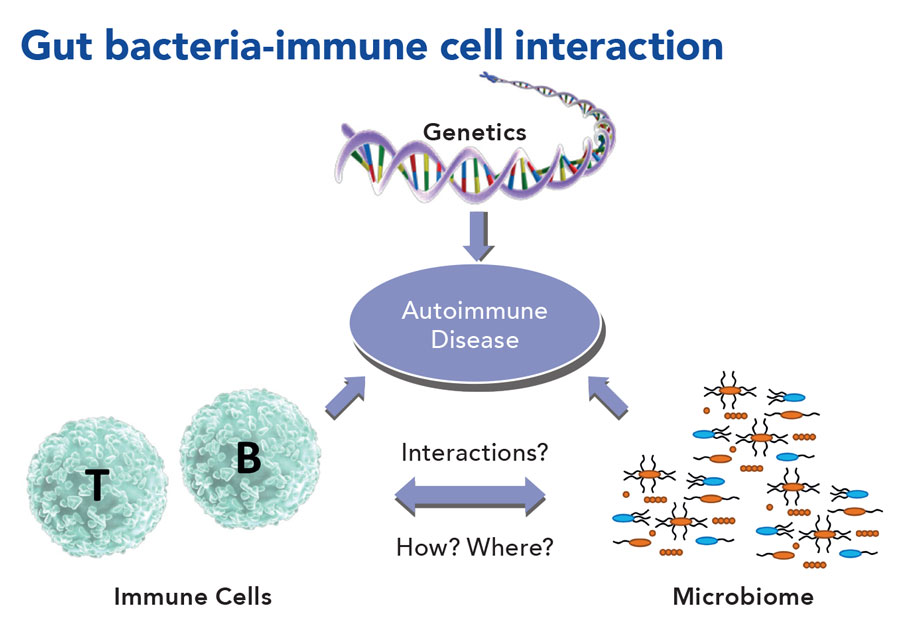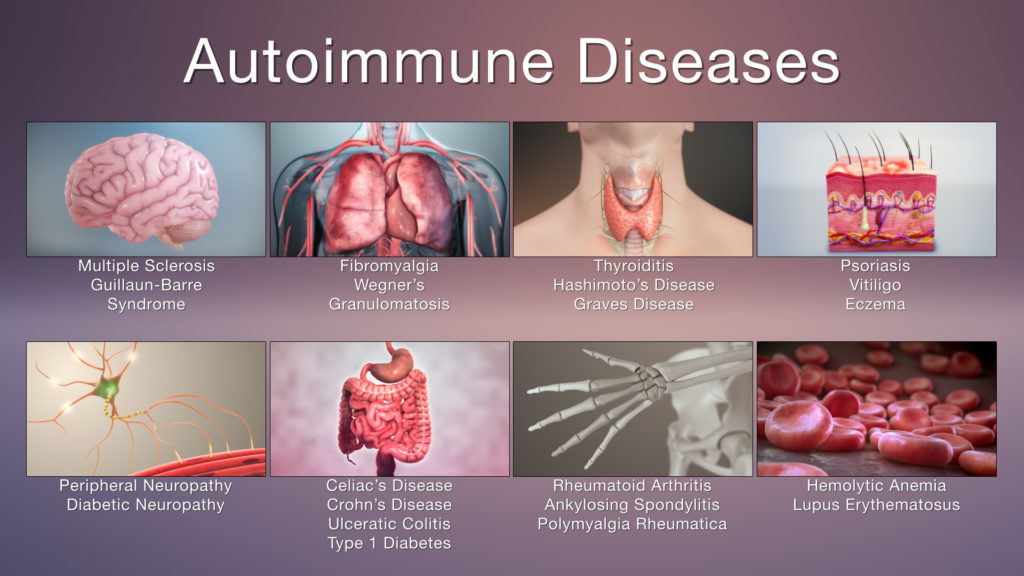Studies in 2015 provided statistics to show how autoimmune disease was increasing in the last decades. There are more than 8 autoimmune diseases identified and according to the NIH more than 23 million Americans are infected. Autoimmune diseases have several triggers like diet, smoking, stress, lack of exercise and sleep that it has become hard for doctors to accurately identify one particular cause for any given condition. As a result, those suffering autoimmune diseases need to make several trips to a doctor before they are reasonably diagnosed.

Two famous cases of autoimmune diseases affecting celebrities are those of Selena Gomez who suffered from Lupus since 2015 to the point of requiring a kidney transplant and Kim Kardashian who was diagnosed with psoriasis.
The link-between Autoimmune disease and gut bacteria

Efforts have stepped up in recent years to generate more awareness in autoimmune disease and there is something positive to look forward to in the fight against it. A Research study at Yale University that was published in the journal Science in March 2018 declared that it had found the underlying cause including methods that could develop better treatments for the illness. It was found to be a type of gut bacteria that was the culprit. However new studies in October 2018 also found another type of gut bacterium that causes the immune system to turn on its own cells.
In the first study, it was found that autoimmune disease was linked to a gut bacterium called Enterococcus gallinarum. The study found that when the bacterium spontaneously migrated from the gut to various organs in the body like the lymph nodes, spleen or liver, an autoimmune response was triggered
The research found the Bacteria contributed towards triggering an autoimmune response.

An autoimmune disease is a chronic inflammatory condition in which the immune system of a person mistakenly perceives its own cells as a threat responds by destroying healthy cells and tissues. Examples of Autoimmune diseases are lupus, rheumatoid arthritis, and Hashimoto’s thyroiditis.
In the study, genetically engineered mice were made susceptible to autoimmune diseases. Analysis of their gut bacteria revealed that the bacteria known as Enterococcus gallinarum was causing inflammation and involved in producing antibodies that triggered an autoimmune response. Further analysis found the same bacteria present in liver cells of patients suffering from autoimmune disease.
The research was also able to develop effective ways to reduce autoimmune symptoms through antibiotics and a vaccine that dulled symptoms and suppressed Enterococcus gallinarum. Lead researcher Martin Kriegel said “The vaccine against E. gallinarum was a specific approach, as vaccinations against other bacteria we investigated did not prevent mortality and autoimmunity,” he added “The vaccine was delivered through injection in muscle to avoid targeting other bacteria that reside in the gut. “Treatment with an antibiotic and other approaches such as vaccination are promising ways to improve the lives of patients with autoimmune disease.”
More research is underway to develop a consistent treatment for conditions like lupus and autoimmune liver disease.
A second gut bacteria was discovered in December 2018 that promoted autoimmune disease

Research at Queen’s University also found a gut microbe that pumps out a protein to mimic human protein that triggered the immune system to turn on its own cells by mistake. This time it was a gut bacterium called Bacteroides Fragilis found in the human gut with the ability to produce a human-like protein called ubiquitin which is necessary for normal cell processes in the body.
The culprit, in this case, is called Bacteroides fragilis, a bacterium that normally lives in the human gut. This bacterium produces a human-like protein called ubiquitin needed for all the normal cell processes in our bodies. The mimic protein was found to be the cause for triggering autoimmune diseases, such as rheumatoid arthritis. Professor Sheila Patrick professor emeritus at Queen’s University explained “When we mapped the genome of Bacteroides fragilis a few years ago we were astonished to discover a human-like gene not present in any other bacteria. The protein produced from this gene is nearly the same shape as a protein in almost every human cell.”
Gut bacteria could be the main causes of underlying human conditions

She further stated that “When we discovered that Bacteroides fragilis produces lots of this mimic protein we were very excited. No other bacteria produced a mimic of human ubiquitin and this one lives in our gut. We immediately wondered if it might be linked with autoimmune diseases such as lupus. It has been known since the 1990s that some people with autoimmune diseases have antibodies that target their own human ubiquitin, but we don’t know why this happens. So, we decided to see if people also had antibodies that target the Bacteroides fragilis version of ubiquitin.”
The professor added that the gut bacteria in question could also be an underlying cause of various human conditions that experts are yet to understand. The recently published study is a collaboration with Dr. Linda Stewart, Lecturer at the School of Biological Sciences and Institute for Global Food Security at Queen’s University, Dr. David Edgar, consultant immunologist and head of the Northern Ireland Regional Immunology Service, and Dr. Garry Blakely, senior lecturer at the University of Edinburgh. Read more on the article here
The latest discovery: A gene common to 20 autoimmune disease

The latest study in December 2019 also found a gene common to almost 20 autoimmune diseases that were later used to develop into a drug which in clinical trials reduced psoriasis lesions in 75% of patients.
The latest study in December 2019 also found a new gene TYK2 common to 20 autoimmune diseases including multiple sclerosis, type 1 diabetes, rheumatoid arthritis, lupus, and psoriasis. Since the discovery of this gene, a drug that targets TYK2 has been developed and is showing promise for the treatment of psoriasis, a disease that causes raised, red, scaly patches on the skin. Based on the results, this clinical trial gives hope not only for treating psoriasis but for the treatment of other autoimmune conditions as well. Read more here.
